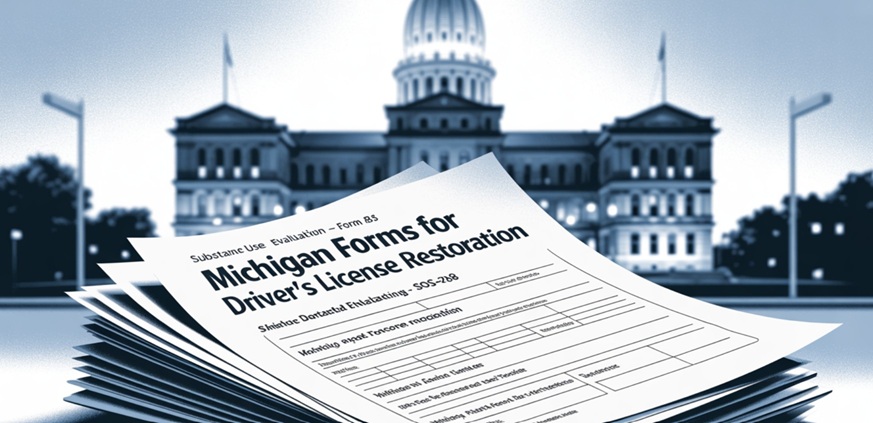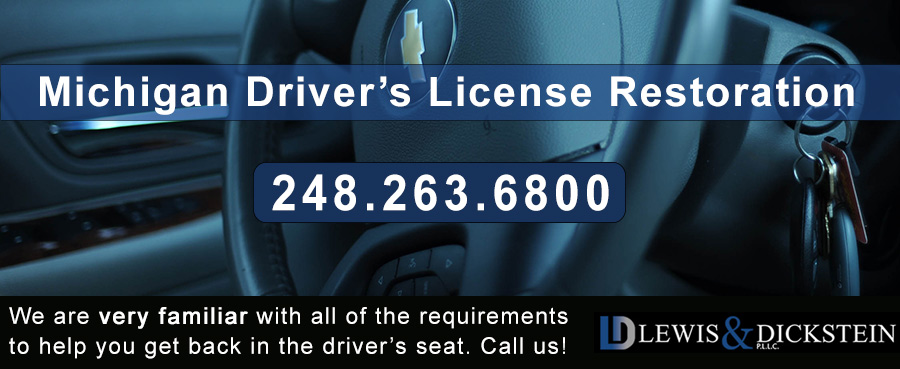Michigan Forms for Driver’s License Restoration: Reinstatement of Driving Privileges
Various forms must be submitted to the Michigan Department of State when you seek restoration of your driving privileges.

What Forms are Needed for Driver’s License Restoration?
If your Michigan driver’s license was revoked or suspended because of multiple OWI or DUI convictions, getting it back isn’t automatic. License restoration is a formal legal process requiring strict documentation, credible evidence, and careful attention to detail. One mistake can delay your chances for another year. Your appeal for restoration of driving privileges will fail if you fail to file the correct and necessary Michigan driver’s license restoration forms. Filing completed forms is the minimum requirement to win an appeal with the Driver Assessment and Appeal Division (DAAD). Perfecting persuasive and compelling forms and submissions gives you the best possible chance at success.
What Is License Restoration or Reinstatement in Michigan?
License reinstatement usually refers to restoring driving privileges after the DAAD revokes someone’s driving privileges following two or more alcohol- or drug-related driving convictions. Restoration applies when the Michigan Department of State revokes someone’s driver’s license. Revocation is indefinite, and the burden is on you to prove to the Michigan Secretary of State (SOS) that you are no longer a danger to the public and that any substance abuse issue is under control and likely to remain under control. Restoration isn’t simple. It requires specific forms, evaluations, drug testing, and often a formal hearing.

Forms Required for a Michigan License Restoration Appeal
Here are the primary documents used when requesting the reinstatement of a revoked driver’s license:
Substance Use Evaluation – Form SOS-258
Form SOS-258, the Substance Abuse Evaluation, is the most essential form in your appeal. It must be completed by a licensed substance abuse evaluator and submitted with your hearing request. The evaluation must detail your history of substance use, treatment, relapse (if any), and prognosis for continued sobriety. This form must be accurate and consistent with all other evidence. Any contradictions or missing details can result in a denial.
Request for Hearing – Form SOS-257
Form SOS-257 starts the process. You use it to formally request a hearing with the Secretary of State’s Administrative Hearings Section (AHS). You must submit it along with your evaluation, drug test results, and other supporting documentation. It is vital that all documentation be consistent, compelling, and credible, and support a finding that any substance abuse issues are in long-term remission with a good or excellent prognosis for long-term sobriety.
12-Panel Drug Screen (No Official Driver’s License Restoration Form)
The DAAD requires a valid and recent (within 90 days) drug test. A certified lab must analyze the test results and include at least 12 panels. The report must also show validity checks, including creatinine and specific gravity levels. The substance abuse evaluator will likely refer you to a qualified drug/alcohol testing facility.
Community Support Letters
You must submit three to six signed letters from people who know you well and who can attest to your long-term sobriety. These letters should describe your sobriety, lifestyle changes, daily behavior, and character. Each letter should be unique, detailed, signed, have contact information, and be notarized. Weak, inconsistent, or repetitive letters can undermine your credibility and result in a denial.
Ignition Interlock Compliance Reports (If Applicable)
If you previously had a restricted license with an ignition interlock device, you’ll need to submit a Breath Alcohol Ignition Interlock Device (BAAID) report showing consistent compliance. Proof of consistent compliance includes proof of installation, regular monitoring, and no evidence of tampering or violations. If there were violations, you will have to be ready with a compelling argument and documentation to show why the violations should not result in denial.
Request for Administrative Review – Form SOS-257A (Optional)
This form is used only by out-of-state residents who want to avoid returning to Michigan for a hearing. It requires all the same documentation as a standard request, and must include a notarized statement affirming out-of-state residency. There is no live hearing with an administrative review for out-of-state residents.

Common Reasons for Denial if You’ve Filed the Necessary Driver’s License Restoration Forms
Filing the appropriate driver’s license restoration forms is the minimum necessary to achieve restoration of your driving privileges. At your hearing, the hearing officer (similar to a judge) will scrutinize your forms and submissions to find a reason to deny your appeal. It is crucial that the forms are correct, filled out completely, consistent, and achieve all of the necessary requirements to prove your long-term, sustained sobriety.
- Evaluation is incomplete or inconsistent
- Drug screen is outdated or invalid
- Letters of support are vague or not credible
- Testimony conflicts with written evidence
- The applicant is unprepared for the hearing
If the DAAD denies your petition, you must wait another whole year before reapplying. Most denials result from avoidable errors or a failure to meet the legal burden of proof. Your only option for restoration before you are eligible to appeal again to the DAAD is with an appeal to your local circuit court for restoration of your driving privileges.
Frequently Asked Questions About Driver’s License Restoration Forms
When am I eligible to request restoration?
You must wait at least one year before you can apply for restoration of your driving privileges if the DAAD revoked your license after two or more alcohol- or drug-related convictions. If they deny your appeal, you must wait another whole year before trying again.
What’s the difference between a suspension and a revocation?
A suspension ends automatically after a set period, and reinstatement typically just requires a fee. A revocation is indefinite, and you must apply for restoration with the Secretary of State.
Can I restore my license without a hearing?
Only if you live out of state and are eligible for an administrative review, otherwise, you must attend a hearing before the Secretary of State’s Administrative Hearings Section.
Do I automatically get a full license back?
No. Most people receive a restricted license first, with conditions like an ignition interlock device. You must use the restricted license successfully for at least one year before applying for full reinstatement.
How long does the restoration process take?
Once you submit your forms, you can expect a hearing in two to three months. After the hearing, expect another month or more for a written decision.
Can I do this without a lawyer?
You can, but appealing without a qualified license restoration attorney is not recommended. Most self-represented applicants are denied. A skilled attorney can help ensure your documentation is accurate, your testimony is credible, and your case is strong.

Let a Skilled Legal Advocate Guide You Through the Process
A revoked license can severely impact your ability to work, care for loved ones, and live independently. Fortunately, Michigan law does offer a path to regain driving privileges if you meet strict requirements and can prove sustained sobriety.
The license restoration process is complex and demanding. It requires accurate paperwork, credible supporting documents, and strong testimony under oath. The DAAD denies many applicants simply because they didn’t fully understand what the Secretary of State requires or how to present their case.
If you’re considering applying for license restoration after a revocation due to alcohol- or drug-related convictions, it’s worth speaking with an attorney who has handled these cases before. They can help ensure your documentation is complete, your evidence is consistent, and your presentation is effective.
With the right preparation and guidance, it’s possible to restore your driving privileges and move forward with your life.
Call us today at (248) 263-6800 for a free consultation or complete an online Request for Assistance Form. We will contact you promptly and find a way to help you.













